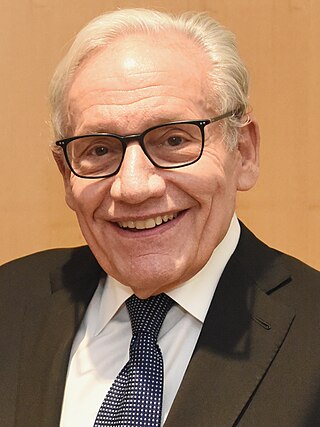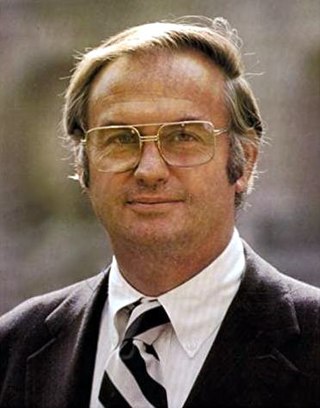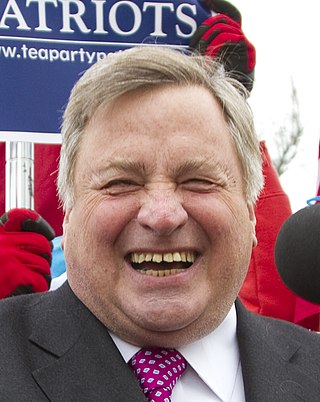
The 2000 United States presidential election was the 54th quadrennial presidential election, held on Tuesday, November 7, 2000. Republican candidate George W. Bush, the incumbent governor of Texas and eldest son of the 41st president, George H. W. Bush, won the election, defeating incumbent Vice President Al Gore. It was the fourth of five American presidential elections, and the first since 1888, in which the winning candidate lost the popular vote, and is considered one of the closest U.S. presidential elections, with long-standing controversy about the result. Gore conceded the election on December 13.

A Reagan Democrat is a traditionally Democratic voter in the United States, referring to working class residents who supported Republican presidential candidates Ronald Reagan in the 1980 and the 1984 presidential elections, and George H. W. Bush during the 1988 presidential election. The term Reagan Democrat remains part of the lexicon in American political jargon because of Reagan's continued widespread popularity among a large segment of the electorate.

The Clinton–Lewinsky scandal was a sex scandal involving Bill Clinton, the president of the United States, and Monica Lewinsky, a White House intern. Their sexual relationship began in 1995—when Clinton was 49 years old and Lewinsky was 22 years old—and lasted 18 months, ending in 1997. Clinton ended a televised speech in late January 1998 with the later infamous statement: "I did not have sexual relations with that woman, Ms. Lewinsky." Further investigation led to charges of perjury and to the impeachment of Clinton in 1998 by the U.S. House of Representatives. He was subsequently acquitted on all impeachment charges of perjury and obstruction of justice in a 21-day U.S. Senate trial.

Robert Upshur Woodward is an American investigative journalist. He started working for The Washington Post as a reporter in 1971 and now holds the title of associate editor.
A Sister Souljah moment is a politician's calculated public repudiation of an extremist person, statement, group, or position that is perceived to have some association with the politician's own party.

Lowell Palmer Weicker Jr. was an American politician who served as a U.S. Representative, U.S. Senator, and the 85th Governor of Connecticut.
"Vast right-wing conspiracy" is a phrase popularized by a 1995 memo by political opposition researcher Chris Lehane and then referenced in 1998 by the then First Lady of the United States Hillary Rodham Clinton, in defense of her husband, President Bill Clinton, characterizing the continued allegations of scandal against her and her husband, including the Lewinsky scandal, as part of a conspiracy by Clinton's political enemies. The term has been used since, including in a question posed to Bill Clinton in 2009 to describe verbal attacks on Barack Obama during his early presidency. Hillary Clinton mentioned it again during her 2016 presidential campaign.
In politics, opposition research is the practice of collecting information on a political opponent or other adversary that can be used to discredit or otherwise weaken them. The information can include biographical, legal, criminal, medical, educational, or financial history or activities, as well as prior media coverage, or the voting record of a politician. Opposition research can also entail using "trackers" to follow an individual and record their activities or political speeches.

The 1992 presidential campaign of Bill Clinton, the then-governor of Arkansas, was announced on October 3, 1991, at the Old State House in Little Rock, Arkansas. After winning a majority of delegates in the Democratic primaries of 1992, the campaign announced that then-junior U.S. senator from Tennessee, Al Gore, would be Clinton's running mate. The Clinton–Gore ticket defeated Republican incumbent President George H. W. Bush and Vice President Dan Quayle in the presidential election on November 3, 1992, and took office as the 42nd president and 45th vice president, respectively, on January 20, 1993.

Richard Samuel Morris is an American political author and commentator who previously worked as a pollster, political campaign consultant, and general political consultant.

Lanny Jesse Davis is an American political operative, lawyer, consultant, lobbyist, author, and television commentator. He is the co-founder and partner of the law firm of Davis Goldberg & Galper PLLC, and co-founder and partner of the public relations firm Trident DMG. From 1996 to 1998, he served as a special counsel to President Bill Clinton, and was a spokesperson for the President and the White House on matters concerning campaign-finance investigations and other legal issues.

The Capitol Steps was an American political-satire group that performed from 1981 to 2020. Most of the Capitol Steps' material parodied well-known contemporary songs. The songs were interspersed with other routines, including a spoonerism routine near the end of each performance with innuendoes about recent scandals. They have released over 40 albums, primarily song parodies. Originally consisting of congressional staffers who performed around Washington, D.C., the troupe was later primarily made up of professional actors and singers. The Capitol Steps have performed on PBS, public radio and in small- and medium-size venues around the United States. On January 13, 2021, the Capitol Steps announced via Twitter that they were shutting down after 39 years of performing.
"Follow the money" is a catchphrase popularized by the 1976 docudrama film All the President's Men, which suggests political corruption can be brought to light by examining money transfers between parties.

Gallup was the first polling organization to conduct accurate opinion polling for United States presidential elections. Gallup polling has often been accurate in predicting the outcome of presidential elections and the margin of victory for the winner. However, it missed some close elections: 1948, 1976 and 2004, the popular vote in 2000, and the likely-voter numbers in 2012. The month section in the tables represents the month in which the opinion poll was conducted. D represents the Democratic Party, and R represents the Republican Party. Third parties, such as the Dixiecrats and the Reform Party, were included in some polls.
Fundraising plays a central role in many presidential campaigns, and is a key factor in determining the viability of candidates. Money raised is applied for the salaries of non-volunteers in the campaign, transportation, campaign materials, media advertisements and other contingencies. Under United States law, officially declared candidates are required to file campaign finance details with the Federal Elections Commission (FEC) at the end of every calendar month or quarter. Summaries of these reports are made available to the public shortly thereafter, revealing the relative financial situations of all the campaigns.

This article lists those who were potential candidates for the Democratic nomination for Vice President of the United States in the 2000 election. Incumbent Vice President Al Gore won the 2000 Democratic nomination for President of the United States, and chose Connecticut Senator Joseph Lieberman as his running mate on August 7, 2000. Lieberman, a centrist two-term Democratic senator, was chosen for being "tough on defense" and foreign policy issues. Lieberman was the first Jewish nominee chosen for a national ticket. The choice of Lieberman was announced shortly before the 2000 Democratic National Convention. Former Secretary of State Warren Christopher led the vetting process. The Gore–Lieberman ticket ultimately lost to the Bush–Cheney ticket. Coincidental to the presidential election, Lieberman was re-elected to a third term as senator from Connecticut.

The cultural and political image of Hillary Clinton has been explored since the early 1990s, when her husband Bill Clinton launched his presidential campaign, and has continued to draw broad public attention during her time as First Lady of the United States, U.S. Senator from New York, 67th United States Secretary of State, and the Democratic Party's nominee for President of the United States in the 2016 election.

The 1972 United States presidential election in Texas was held on November 7, 1972, as part of the 1972 United States presidential election. Incumbent Republican President Richard Nixon overwhelmingly won the state of Texas with 66.20% of the vote, to the Democratic Party candidate George McGovern's 33.24%, thus giving him the state's 26 electoral votes. This result made Texas 9.8% more Republican than the nation-at-large. This was the first time a Republican won the state of Texas since Texas-born Dwight D. Eisenhower won it in 1956. Even as Democrat Dolph Briscoe won the gubernatorial election on the same Ballot.

Donald Trump, the President of the United States from 2017 to 2021, was the subject of segments featured in episodes of Last Week Tonight with John Oliver during Trump's 2016 Republican primary and general election campaigns and presidency, most of which were discussed in the show's opening news recap segment. The ones listed have received prominent coverage from other media, and feature Trump or his actions as part of the main segment.

The 1972 United States presidential election in Missouri took place on November 7, 1972. All fifty states and the District of Columbia were part of the 1972 United States presidential election. Voters chose 12 electors to the Electoral College, who voted for president and vice president.















